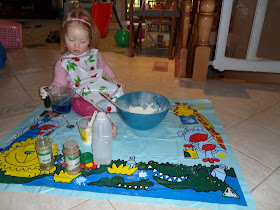This super sensory, tactile experience allows your child to experiment with various liquids and solids and work out for themselves, the relationships between the ingredients. And the best part is, it takes very little preparation and only uses left over bits and pieces from your own pantry.
This is LOTS of fun but can get very messy... (isn't that half the fun though?) :)
Ages: 2+
(M was 2 here)
Lay out the ingredients for your child and provide various containers, spoons, implements etc that they could use in their processes.
Materials: flour, baking powder/soda, coloured water, vinegar and some old herbs, bowls, spoons etc.
Practicing hand eye coordination while pouring in some vinegar
Nothing happened when the vinegar was added to flour but LOOK at what happens with this other white powder! (Baking soda/powder)
"Oooh, the more I stir the more bubbly and frothy it gets"
Time to make it smell nice, let's "sprinkle" some herbs
What does it feel like? "Squishy and runny and gooey with little bits in it." Learning that the herbs don't change their state unlike the powders and liquids.
It's too "thin" we should add more flour to make it "thicker"
"Woah! Look at the difference. It is so sticky and thick now"
The more she mixed the thicker and stickier it got
One lesson for Mum despite the size of the art smock... perhaps shorts will work better next time. Definitely old clothing.
Handy Tips:
- Use whatever ingredients you already have at home. I try to use old pantry items that have been sitting around for a long time that I probably should replace anyway.
- Use new language and descriptive words like, "frothy, thicker, squishy" etc. This will help with their language development.
-Ask questions to help connect their understanding and use vocabulary to give them words to describe what they're experiencing. Eg, "What are the little lumps in your mixture?", "It's very runny, how could you make it thicker?", "It's very thick, how could you make it thinner/runnier?" etc
- Take the time to focus on improving particular skills with your child and help them to practice, ie, pouring so that all the liquid goes in the container etc.
Happy playing,
Debs :)
New Here? Subscribe to get all activities sent directly to you

















